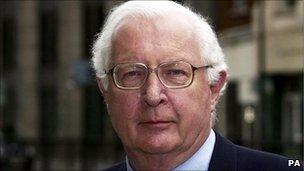Right-to-die activist Nan Maitland 'died with dignity'
- Published

Dr Michael Irwin had dinner with Ms Maitland the night before she died
A right-to-die activist who accompanied a fellow campaigner to a Swiss assisted suicide organisation said she died in a "wonderful and dignified manner".
Former GP Michael Irwin said Nan Maitland, 84, who was not terminally ill but suffered from arthritis, did not want to "linger on".
Dr Irwin said he hoped the police would get in touch with him in order to reopen the assisted suicide debate.
Assisting suicide is illegal and carries a jail term of up to 14 years.
But more than 100 Britons have gone to Dignitas in Switzerland to die and none of the relatives and friends involved in the cases have been prosecuted.
'Personal choice'
Mother-of-three Ms Maitland, who was separated from her husband, died on 1 March. She had travelled to Switzerland with Dr Irwin and another friend. Dr Irwin and Ms Maitland had known each other for 15 years and had co-founded the Society for Old Age Rational Suicide.
Dr Irwin told BBC Radio 5 live's Breakfast programme Ms Maitland was an "educated and intelligent" woman who had been discussing her plans for several years.
"She would have been 85 in August and she was suffering increasingly from arthritis and she just didn't want to linger on," he said.
He said they went for a three-hour dinner the night before she died and they discussed their families and right-to-die activities.
"On the day she died, we travelled in a chauffeur-driven limousine to a Swiss doctor, who gave the final approval for her doctor-assisted suicide," he said.
"Then we went to the place where she did die and she was completely relaxed throughout the whole process. She was determined to do what she did and she had her wishes fulfilled in a wonderful, dignified manner."
Dr Irwin added: "I have helped people to die in the past and if they have good, sensible reasons and they are mentally competent and at an age where they cannot expect to live many more years, I think it should be their personal individual choice."
He said he doubted the police would be in touch with him as both he and Ms Maitland were well-known right-to-die campaigners.
'Unbearable future'
In her farewell message to friends and family, Ms Maitland, who lived in London, said she had had a "wonderful life" and the "great, good fortune" to die at a time of her own choosing.
"I have a great feeling of relief that I will have no further need to struggle through each day in dread of what further horrors may lie in wait," she said.
"For many years, I have feared the long period of decline, sometimes called 'prolonged dwindling', that so many people unfortunately experience before they die.
"Please be happy for me that I have been able to escape from this, for me, unbearable future."
A spokesman for Dignity in Dying said they were sad to hear of Ms Maitland's death but did not agree with her stance.
"Dignity in Dying does not support a change in the law to allow non-terminally ill people the legal option to ask for help to end their life," he said.
"We campaign for a change in the law to allow the choice of assisted dying for terminally ill, mentally competent adults only."
Last year, the law on assisted suicide was clarified but it remains an offence to encourage or assist a suicide or a suicide attempt in England and Wales.
The law is almost identical in Northern Ireland and although there is no specific law in Scotland, in theory someone could be prosecuted under homicide legislation.
Under the new guidance, issued in February 2010, a range of factors will be taken into account when deciding if a prosecution is appropriate or not. These include whether the victim reached a "voluntary, clear, settled and informed" decision.
The Met Police said it had no details of Ms Maitland's death. Dr Irwin lives in Surrey and a spokesman for that force said "no action" was planned at this stage.
A Crown Prosecution Service spokesman said: "We have to wait until the police investigation is complete".
- Published25 June 2010